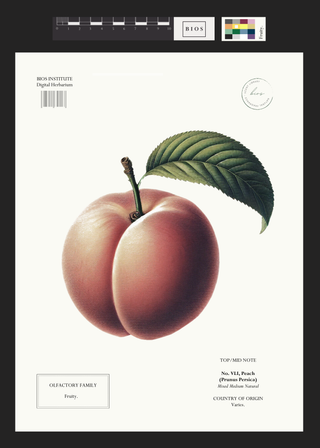

Prunus persica, commonly known as the peach tree, is believed to be native to Northwest China, specifically in regions around the Tarim Basin and the foothills of the Tian Shan Mountains. From its native range, peaches were spread to other parts of the world through trade and exploration. Our peach is sourced from various countries.
Peaches have a long history of cultivation and have been enjoyed for their delicious and juicy fruit for thousands of years. They were highly valued in ancient China and were later introduced to Persia (modern-day Iran) and other parts of the world along ancient trade routes.
Peach has a distinct aroma characterized by its sweet and juicy scent. It carries a fruity, floral, and slightly creamy quality, which can vary depending on the variety of peach used. The fragrance of peach is often associated with youthfulness, optimism, and a carefree spirit.
Peach is a versatile note that blends well with a wide range of other ingredients in perfumery. It can be combined with floral, fruity, citrus, and woody notes to create various fragrance compositions. The addition of peach in perfumes can enhance their overall sweetness and provide a juicy, luscious quality. It is a Top/Middle note found in our Fruity family.
Peach is often associated with femininity and is commonly used in perfumes targeted towards women. Its delicate and alluring scent adds a touch of playfulness and sensuality to fragrances. Peach notes are frequently found in floral and fruity-floral compositions, adding a refreshing and inviting element.
The aroma of peach is known to have an uplifting and mood-enhancing effect. It can evoke feelings of joy, happiness, and optimism. The sweet and vibrant scent of peach is often used to create fragrances that are lively, energetic, and youthful in nature.
In summary, peach is valued in perfumery for its sweet, fruity, and refreshing aroma. It adds a touch of playfulness, femininity, and vitality to fragrances, making it a popular choice among perfumers when creating compositions that evoke a sense of youthful charm and optimism.
In Chinese culture, the peach has a long history and is associated with various positive meanings. It is considered a symbol of longevity, immortality, and good luck. The peach is also connected to the legend of the "Peach Blossom Spring," representing a utopian world of peace and harmony. Peaches are often depicted in Chinese art, literature, and folklore, and they are highly valued during the Chinese New Year as a symbol of prosperity and abundance.
In Japanese culture, the peach, known as "momo," is considered a symbol of youth, vitality, and longevity. It is often associated with femininity and is regarded as a sacred fruit. The peach is featured in Japanese folklore, particularly in the story of Momotarō, a brave hero who was born from a giant peach. Peaches are also used in traditional ceremonies and decorations during special occasions.
In ancient Greek and Roman mythology, the peach was associated with various deities and myths. It was connected to Aphrodite, the goddess of love and beauty, and was considered a symbol of fertility and divine love. Peaches were often depicted in ancient art and were believed to have mystical and magical properties.
In Persian culture, the peach represents beauty, romance, and abundance. It is celebrated as a symbol of love and is associated with the famous Persian poet Hafez. The peach features in Persian literature, poetry, and art as a metaphor for the sweetness and pleasures of life.
In European traditions, the peach is often associated with summer, harvest, and abundance. It is a popular fruit used in culinary preparations and is highly valued for its sweet and juicy flavor. In some European folklore, the peach is connected to luck, prosperity, and fertility.
Peach
- Unit price
- /per
Please note this product format is a small vial that contains roughly 20 drops of scent concentrate. This can be purchased à la carte but is intended to be used with our Perfume Kit.
SCENT SPECIFICATIONS
Latin Name: Prunus Persica
Extraction Method: Isolate
Country of Origin: Varies
All of the scents in our library our naturally derived - our collection includes essential oils, absolutes, concretes, isolates, enfleurage, macerations, oleoresins, and mixed medium naturals.
Adding product to your cart
Prunus persica, commonly known as the peach tree, is believed to be native to Northwest China, specifically in regions around the Tarim Basin and the foothills of the Tian Shan Mountains. From its native range, peaches were spread to other parts of the world through trade and exploration. Our peach is sourced from various countries.
Peaches have a long history of cultivation and have been enjoyed for their delicious and juicy fruit for thousands of years. They were highly valued in ancient China and were later introduced to Persia (modern-day Iran) and other parts of the world along ancient trade routes.
Peach has a distinct aroma characterized by its sweet and juicy scent. It carries a fruity, floral, and slightly creamy quality, which can vary depending on the variety of peach used. The fragrance of peach is often associated with youthfulness, optimism, and a carefree spirit.
Peach is a versatile note that blends well with a wide range of other ingredients in perfumery. It can be combined with floral, fruity, citrus, and woody notes to create various fragrance compositions. The addition of peach in perfumes can enhance their overall sweetness and provide a juicy, luscious quality. It is a Top/Middle note found in our Fruity family.
Peach is often associated with femininity and is commonly used in perfumes targeted towards women. Its delicate and alluring scent adds a touch of playfulness and sensuality to fragrances. Peach notes are frequently found in floral and fruity-floral compositions, adding a refreshing and inviting element.
The aroma of peach is known to have an uplifting and mood-enhancing effect. It can evoke feelings of joy, happiness, and optimism. The sweet and vibrant scent of peach is often used to create fragrances that are lively, energetic, and youthful in nature.
In summary, peach is valued in perfumery for its sweet, fruity, and refreshing aroma. It adds a touch of playfulness, femininity, and vitality to fragrances, making it a popular choice among perfumers when creating compositions that evoke a sense of youthful charm and optimism.
In Chinese culture, the peach has a long history and is associated with various positive meanings. It is considered a symbol of longevity, immortality, and good luck. The peach is also connected to the legend of the "Peach Blossom Spring," representing a utopian world of peace and harmony. Peaches are often depicted in Chinese art, literature, and folklore, and they are highly valued during the Chinese New Year as a symbol of prosperity and abundance.
In Japanese culture, the peach, known as "momo," is considered a symbol of youth, vitality, and longevity. It is often associated with femininity and is regarded as a sacred fruit. The peach is featured in Japanese folklore, particularly in the story of Momotarō, a brave hero who was born from a giant peach. Peaches are also used in traditional ceremonies and decorations during special occasions.
In ancient Greek and Roman mythology, the peach was associated with various deities and myths. It was connected to Aphrodite, the goddess of love and beauty, and was considered a symbol of fertility and divine love. Peaches were often depicted in ancient art and were believed to have mystical and magical properties.
In Persian culture, the peach represents beauty, romance, and abundance. It is celebrated as a symbol of love and is associated with the famous Persian poet Hafez. The peach features in Persian literature, poetry, and art as a metaphor for the sweetness and pleasures of life.
In European traditions, the peach is often associated with summer, harvest, and abundance. It is a popular fruit used in culinary preparations and is highly valued for its sweet and juicy flavor. In some European folklore, the peach is connected to luck, prosperity, and fertility.
